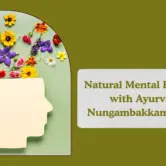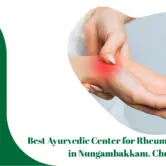Best Ayurvedic Center for Rheumatoid Arthritis in Nungambakkam, Chennai – F2 Care
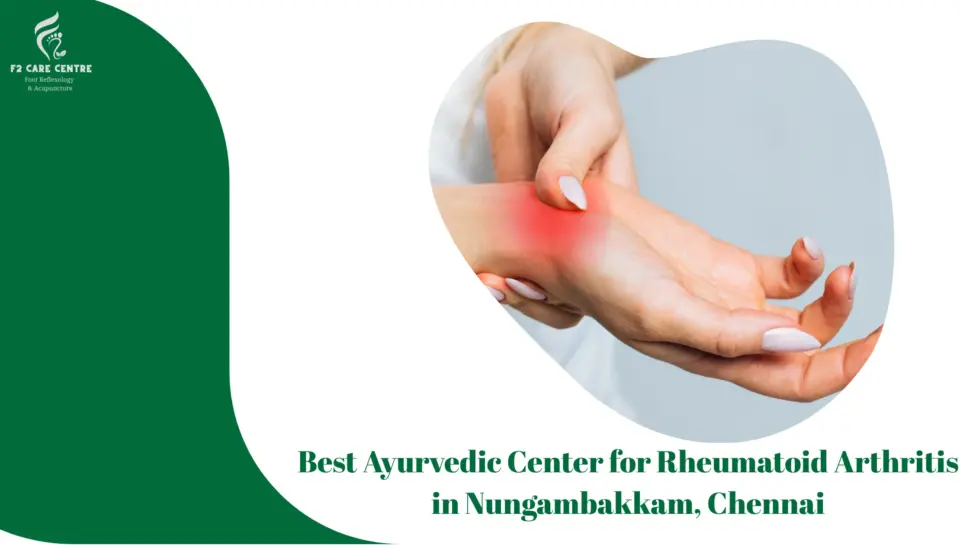
Ayurveda, a holistic healing system practiced for over 5,000 years, addresses not just the symptoms of illness but the root cause, bringing balance to the body, mind, and spirit. At F2 Care, the best Ayurvedic center for rheumatoid arthritis in Nungambakkam, Chennai, we offer a specialized and proven Ayurvedic approach to rheumatoid arthritis (RA)—known in Ayurveda as Amavata.
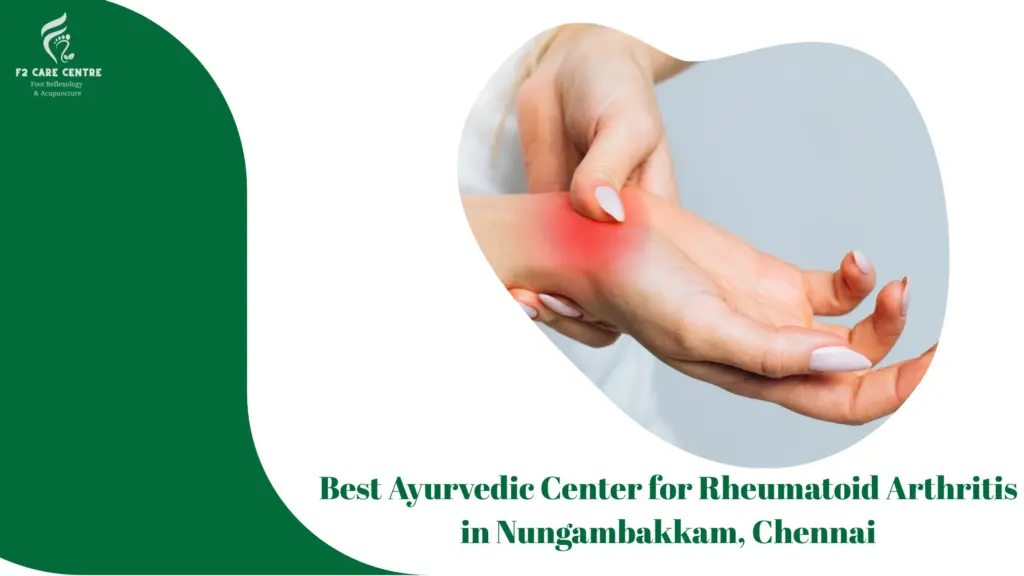
Understanding RA in Ayurveda
According to Ayurveda, RA (Amavata) is caused by an imbalance of Vata dosha combined with the accumulation of Aama—undigested metabolic waste. Inflammation, stiffness, joint pain, and limited movement result from this. The Ayurvedic approach focuses on detoxifying the body, restoring dosha balance, and enhancing the immune and digestive systems to prevent further joint damage.
Detoxification with Panchakarma
At the Best Ayurvedic Center for Rheumatoid Arthritis in Nungambakkam, Chennai, our core Ayurvedic treatment for RA includes the classical detoxification procedure known as Panchakarma. These ancient therapies cleanse deep tissues, eliminate toxins, and calm the aggravated doshas.
Key Panchakarma therapies used for RA include:
Vamana (Emesis) – Induced vomiting to clear upper digestive tract toxins
Purgation, or Virechana, is the process of cleansing the intestines to balance Pitta.
Vasti (Medicated Enema) – Most crucial for RA, removes deep-seated Vata and Aama
Nasya (Nasal Therapy) – Clears toxins from head and neck
Raktamokshana (Bloodletting) – Reduces localized inflammation and purifies blood
Before these procedures, preparatory therapies like Abhyanga (oil massage), Podikizhi (herbal powder massage), Elakizhi (leaf bundle massage) and steam therapy are used to mobilize toxins.
Diet and Lifestyle Modifications
A customized Ayurvedic diet is essential in managing RA. At F2 Care, we recommend an anti-inflammatory, Vata-pacifying diet to support digestion and reduce toxin formation.
Patients are advised to:
- Avoid cold, raw, and processed foods
- Eat warm, cooked meals like rice, wheat, and ragi
- Include anti-inflammatory spices like turmeric, ginger, and cumin
- Reduce dairy and minimize refined sugar
- Incorporate light legumes like mung beans and lentils
Our physicians also guide patients on daily routines, sleep hygiene, and seasonal detox practices to maintain long-term results.
Yoga, Meditation & Exercise
Gentle yoga practices combined with pranayama (breathing exercises) and meditation are highly effective in reducing pain and improving mobility in RA patients. At F2 Care, we create personalized yoga routines to match each patient’s physical ability.
Regular movement helps manage stiffness, while mental relaxation techniques reduce stress—a major trigger for inflammation. All activities are supervised and adjusted based on the patient’s condition.
Tailored Ayurvedic Therapies
Our treatment plans may also include:
Tailadhara – Pouring warm medicated oil over the body
Ksheeravasthi – Enema using medicated milk for deep tissue healing
Navarakkizhi – Rice bolus massage in herbal milk to nourish and strengthen joints
Rasayana Therapy – Herbal tonics that support immunity, tissue regeneration, and joint flexibility
These therapies not only help relieve joint pain but also restore joint function, improve digestion, and boost overall vitality.
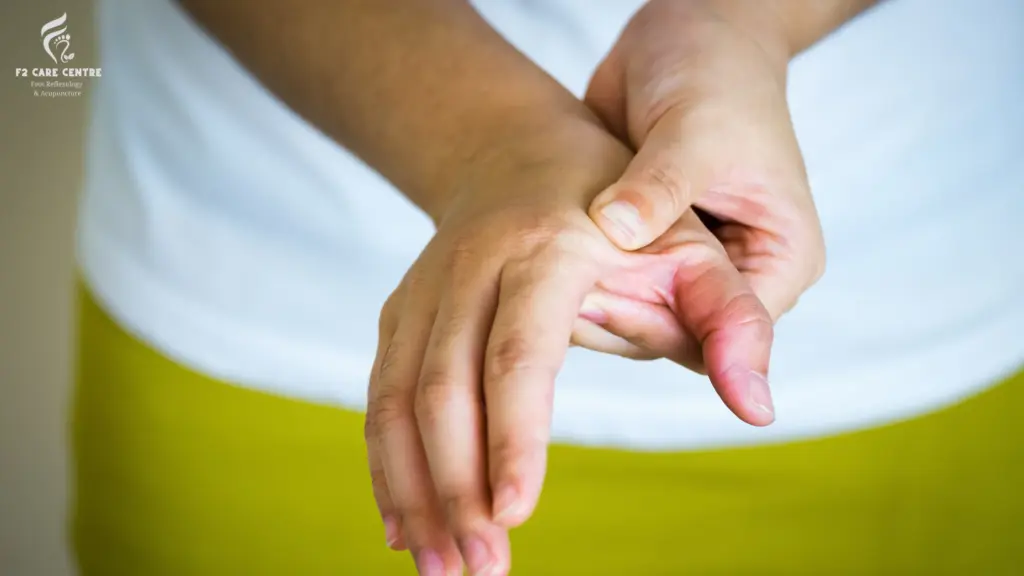
Ayurveda vs. Modern Medicine: A Holistic Advantage
While modern medicine manages RA through painkillers and immunosuppressants, Ayurveda focuses on eliminating the root imbalance. By cleansing the system, strengthening digestion, and rejuvenating tissues, Ayurveda reduces dependency on long-term medication and promotes lasting healing.
Frequently Asked Questions:
1. What is Rheumatoid Arthritis (RA) according to Ayurveda?
In Ayurveda, RA is known as Aamavata, caused by the accumulation of Ama (toxins) and the aggravation of Vata dosha, leading to joint inflammation, pain, and stiffness.
2. How does F2 Care treat Rheumatoid Arthritis with Ayurveda?
F2 Care follows a holistic approach using herbal medicines, Panchakarma therapies (like Virechana, Vasti, and Abhyanga), a personalized anti-inflammatory diet, and lifestyle modifications to reduce pain and inflammation.
3. How long does it take to see improvement with Ayurvedic care?
Results vary depending on the severity and chronicity of the condition. Many patients notice significant symptom relief within 4–6 weeks, especially with regular therapy and dietary compliance.




